Poor Man's Old and New Testament Commentary (12 vols.)
Digital Logos Edition
Overview
Charles Spurgeon exhorted his students, “Gentlemen, if you want something full of marrow and fatness, cheering to your own hearts by way of comment, and likely to help you in giving to your hearers rich expositions, buy Dr. Hawker’s Poor Man’s Commentary . . . he sees Jesus, and that is a sacred gift which is most precious.” Delve into the exegetical and devotional writings of one of the most influential preachers and theologians of eighteenth- and nineteenth-century England. His thoroughly Christ-centered view of Scripture comes through clearly in his extensive nine volume commentary on the whole Bible.
According to Joel R. Beeke of Puritan Reformed Theological Seminary, “Hawker increased in fame and popularity as a powerful ‘high Calvinist’ preacher” and “was remarkably winsome in preaching Christ to all.” Hawker brings his homiletical skill to the reading of Scripture in this rich commentary. His two devotional volumes, included in this collection, will guide you through deep morning and evening meditations on God’s Word. Also included in this collection is The Poor Man’s Dictionary, Hawker’s nearly 1,000-page work on the words of the Old and New Testaments, written as a companion volume to his commentaries. Much more than a dictionary, this work provides encyclopedic and theological treatment on all the words in the Bible.

- Verse-by-verse commentary on the whole Bible
- Concise summaries of every chapter of the Bible
- Devotional reflections on every chapter of the Bible
- Extensive Bible dictionary on all the words in Scripture
There is always such a savor of the Lord Jesus Christ in Dr. Hawker that you cannot read him without profit . . . Full of devotion and sweetness.
—Lectures to My Students, vol. 4, by Charles Spurgeon
Hawker excels in Christ-centered, experiential divinity. He was taught by the Spirit how to find Christ in the Scriptures, as well as how to present Him to hungry sinners in search of daily communion with a personal Redeemer. For the genuine Christian, here is devotional writing at its best: it is always warmly Christ-centered, eminently practical, personally searching.
- Title: Poor Man’s Old and New Testament Commentary
- Author: Robert Hawker
- Volumes: 12
- Pages: 7,981
- Poor Man’s Old Testament Commentary, vol. 1, by Robert Hawker
- Poor Man’s Old Testament Commentary, vol. 2, by Robert Hawker
- Poor Man’s Old Testament Commentary, vol. 3, by Robert Hawker
- Poor Man’s Old Testament Commentary, vol. 4, by Robert Hawker
- Poor Man’s Old Testament Commentary, vol. 5, by Robert Hawker
- Poor Man’s Old Testament Commentary, vol. 6, by Robert Hawker
- Poor Man’s New Testament Commentary, vol. 1, by Robert Hawker
- Poor Man’s New Testament Commentary, vol. 2, by Robert Hawker
- Poor Man’s New Testament Commentary, vol. 3, by Robert Hawker
- The Poor Man’s Concordance and Dictionary to the Sacred Scriptures by Robert Hawker
- The Poor Man’s Morning Portion by Robert Hawker
- The Poor Man’s Evening Portion by Robert Hawker
This title is included in the following collections
You can save when you purchase this product as part of a collection.
Logos 6 Reformed Silver Legacy...
$349.99$349.99Logos 6 Reformed Gold Legacy L...
$849.99$849.99Reformed Commentary Bundle (19...
$2,748.50$1,499.99Logos 6 Reformed Platinum Lega...
$1,499.99$1,499.99
- $1,499.99
- $2,999.99
- $2,999.99
- $2,999.99
- $2,999.99
- $2,999.99
- $4,749.99
- $4,749.99
- $4,749.99
- $4,749.99
- $4,749.99
- $11,399.99
- $11,399.99
- $11,399.99
- $11,399.99
- $23,999.99$17,999.99
- $21,749.99
- $24,999.99
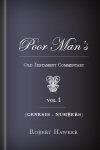
The first volume of Hawker’s extensive commentary covers Genesis through Numbers. Hawker leads you through the scriptural record of creation, the flood, the lives of the patriarchs, and the creation of Israel as a nation. At each turn, Hawker illuminates Christ from these Old Testament passages.
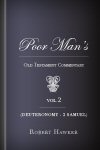
Volume 2 of Hawker’s Old Testament commentary covers Deuteronomy through 2 Samuel. Hawker guides you with devotional richness through the wilderness with the Israelites and into the promised land of Canaan, through the period of the judges and into the establishment of the Israelite monarchy. Rather than merely presenting moralistic examples of biblical figures, Hawker illuminates the pointers to Christ in people and events like the battle between David and Goliath. “We may read this passage sweetly indeed, if we behold in it some faint outlines of Jesus, who in his gracious undertaking for our deliverance is represented by the prophet, who, when he saw that there none to help in all the armies of Israel, and when all hearts gathered blackness, his own arm brought salvation, and of the people, there was none with him. Isaiah 63:3–5.”
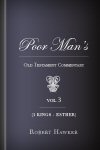
Volume 3 of Hawker’s Old Testament commentary covers 1 Kings through Esther. Hawker takes these historical books of the Bible and shows the life and vibrancy that they communicate as they point to Christ. Join Hawker on this rich journey through the history of Israel.
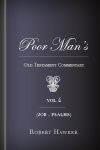
Volume 4 of Hawker’s Old Testament commentary covers Job through Psalms. In explaining his earthly ministry to the disciples, Jesus said in Luke 24:44: “These are my words that I spoke to you while I was still with you, that everything written about me in the Law of Moses and the Prophets and the Psalms must be fulfilled.” Perhaps no one has taken the Christ-centeredness of the Psalms as vigorously as Hawker. With this volume, you can read comments by this master preacher on everything written about Christ in the Psalms.
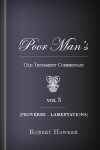
Volume 5 covers Proverbs through Lamentations. Read Hawker’s rich devotional reflections as he takes you through the wisdom literature of Scripture. He does not stop at the moral application of these texts, but goes on to show how they point to Christ and ultimately strengthen our faith in his work, not our own.
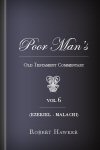
This sixth and final volume of the Poor Man’s Old Testament Commentary covers Ezekiel through Malachi. Hawker’s summaries and reflections on each chapter guide you through these books, strengthening your love for the Savior with each passing chapter as Hawker presents the whole Bible as Christian Scripture.
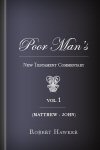
This first volume of the New Testament commentary covers the four Gospels. You will be deeply impacted by Hawker’s rich commentary on the earthly ministry of the Lord Jesus Christ. Take an intimate tour with Hawker through the first century alongside Jesus and his disciples.
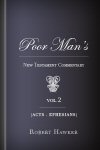
Volume 2 of this New Testament commentary covers Acts through Ephesians. Hawker’s insights on the earliest history of the church and the major Pauline epistles are rich reading for the layperson and will sweeten the sermon preparation and delivery of any minister.
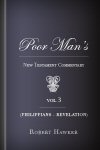
The third and final volume of Hawker’s New Testament commentary covers Philippians through Revelation. The end of this monumental work represents decades of study and deep reflection on God’s Word from one of the ablest ministers of the eighteenth and nineteenth centuries. Stand on the shoulders of a man who spent countless hours in careful meditation on every passage in the Bible.
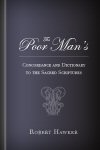
Much more than a dictionary, Hawker’s dictionary offers encyclopedic knowledge on every word in the Authorized Version of the Bible. In addition to definitions, Hawker also includes essays on the theological meaning and significance of biblical words. Designed as a companion volume to the Poor Man’s Commentary, this volume is a wonderful capstone to that monumental work that has benefited so many over the past two centuries.

This morning devotional contains Scripture and reflections for every day of the year. Written for the “poor in spirit,” this gem of Christian devotion brings you the riches of Christ every morning.
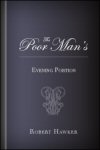
Like Hawker’s Poor Man’s Morning Portion, this evening devotional contains Scripture and reflections for every day of the year. Written for the “poor in spirit,” you will find the riches of Christ as you lay down every evening with this gem of Christian devotion.
Robert Hawker (1753–1827) was a Calvinist preacher in the Church of England. He was educated at Magdalen College, Oxford, and he received his Doctor of Divinity from the University of Edinburgh. Most famous for his pulpit ministry, Robert Hawker was a very well-known and beloved preacher who drew great crowds with his charismatic character, his scholarship, and his erudition. Far from being an ivory-tower minister, Hawker was intimately involved in mercy ministries to the oppressed and needy of his community. He founded the Misericordia Fund to provide relief for the needy and the Corpus Christi Society for needy Christians. He also actively founded schools for underprivileged children and the Great Western Society for Dispersing Religious Tracts among the Poor of the Western District.
Reviews
19 ratings

Stephan Schmid
4/23/2020

Faithlife User
2/8/2018
Dave St. Hilaire
7/29/2015

daren dirksen
12/29/2014

Dustin Payne
9/27/2014

Matthew John Buttner
9/5/2014
I haven't used the commentaries much yet, but The Poor Man's Morning Portion and its Evening companion volume are rich devotionals. The daily readings are concise, Christ-centered, and doxological. If you want to learn how to see Christ in the OT and how to preach the gospel to yourself, Poor Man's is the devotional for you. Be advised Hawker will sometimes over allegorize or spiritualize the text in parts, but all in all the readings will bless your thirsty soul. Blessed are the poor in spirit, indeed.
Liam
12/14/2013

StevenG
12/13/2013

Shaun Tabatt
12/2/2013
As I’ve been considering additions to my library, one of the commentary sets that caught my eye recently was the Poor Man’s Old and New Testament Commentary set by Robert Hawker. The first thing that drew me in was the name. I had never heard of Poor Man’s, but it got me thinking there was going to be a good cost to benefit ratio in there somewhere for a frugal guy like me. The second thing that intrigued me was the endorsements. I highly respect Dr. Joel R. Beeke and a am a fan of Charles Spurgeon, so their words definitely had weight for me. Here’s a bit of what they each had to say about Robert Hawker: “Hawker excels in Christ-centered, experiential divinity. He was taught by the Spirit how to find Christ in the Scriptures, as well as how to present Him to hungry sinners in search of daily communion with a personal Redeemer. For the genuine Christian, here is devotional writing at its best: it is always warmly Christ-centered, eminently practical, personally searching.” —Joel R. Beeke “There is always such a savor of the Lord Jesus Christ in Dr. Hawker that you cannot read him without profit . . . Full of devotion and sweetness.” —Lectures to My Students, vol. 4, by Charles Spurgeon And the third thing that drew me in was the price. Some commentary sets can run you into several hundreds and even thousands of dollars. At the time of this review, Poor Man’s Old and New Testament Commentary is available from LOGOS Bible Software for a mere $126.95, which is a $345.05 savings when compared to buying these twelve volumes in print. Given the strong endorsements from Beeke and Spurgeon, I was curious to find out a bit more about Robert Hawker. Here are some of the things I found particularly interesting about his life: *Lived from 1753-1827. *Married Anna Reins when he was 19 years old. They had 8 children together. *Studied medicine and served in the marines as an assistant surgeon. *Received a Doctor of Divinity from the University of Edinburgh. *Diligently served the poor and oppressed. I don’t have any major research projects going on right now, so my current regular interaction with LOGOS Bible software is my reading plan to go through the New Testament via The NET Bible in six months. I love the passage guide that shows up to the left of the reading window, allowing me easy access to all of the commentaries in my library that correlate to the verses I’m currently reading. Each day as I’ve been doing my daily Bible reading, I take a few extra minutes to dig deeper into the text using the Poor Man’s Old and New Testament Commentary. As you begin utilizing this commentary, you’ll soon realize there is a consistent layout across the commentary set. As you scroll through a commentary, each section is broken up by the heading of CHAP. 1, CHAP. 2, etc. Following that, the first thing you’ll encounter is CONTENTS, which starts with a brief summary of the chapter. For example, here’s the summary for Matthew 18: “The Lord Jesus is here teaching his disciples humbleness. He speaks of his own, and his Father’s good pleasure, for the salvation of every one of his little ones. The Chapter is closed in a parable.” Next you come to the actual commentary about the verses, sometimes covering one verse at a time and other times a range of verses. For example, here’s the commentary for Matthew 18: 15-20: “15–19. I pray the Reader to remark, the affection Jesus insists upon, to subsist between brethren. And indeed as they are members of Christ’s body; brethren of Jesus, and of each other; one spirit moves in all. 1 Cor. 12 throughout. 20. To the little infirmities, which from the remains of indwelling corruption, may, and will, occasionally break out, how precious is the direction of Jesus. Oh! that it were more generally adopted in the Church of Christ! And what an unanswerable argument doth the Lord here leave upon record, for the constant meeting together of his whole body, both in private and public ordinances. Zech. 2:5, 10, 11. Matt. 20:28.” You’ll notice there are some cross-references in the above quotation. These are hyperlinked in the text, so you can mouse over them to read the verse(s) or click on the link to view that passage in a separate window. Each section comes to a close with REFLECTIONS. The best way I could describe this is part sermon and part prayer. For example, here’s the reflection for Matthew chapter 18: “How truly blessed is it to have our hearts brought under divine teaching, and made like the simplicity of a weaned child. See my soul in the instance of these disciples of Jesus, how much our minds are wedded to the concerns of this world. Oh! for grace to be converted, and become as little children, that we may be truly great in the kingdom of heaven. Blessed Lord Jesus! may I never lose sight of this promise that thy presence is eminently manifested in the assemblies of thy people: for sure I am, that all the beauty and glory; all the power and efficacy; all the success and blessing, which can be derived from ordinances, can only be derived, because Jesus hath assured his Church, that wherever two or three are gathered together in his name, there he is in the midst of them, and that to bless them. Thanks to my dear Lord for this beautiful and instructive Parable. Yea, Lord! my debt was so great, in ten thousand talents as made me insolvent for ever. In vain were it for me to say, Lord have patience with me and I will pay thee all. Never to all eternity, could I have done it. Oh! then add a grace more to the merciful forgiveness of all; and incline my heart to be merciful, even as my father which is in heaven is merciful! Precious Jesus! help me to imitate thee in all things!” That’s the rhythm of things in the Poor Man’s Old and New Testament Commentary set: contents, reflections, repeat…contents, reflections, repeat… What has moved me most about this commentary set is the reverential and worshipful tone in Hawker’s writing. Many of the other reference works in my library have a lot of great information, but at times can feel a bit dry. Hawker’s awe, wonder, and love of Christ and His word drips off of every page. I felt as if Hawker was drawing me into a time of worship and praise each time I read. This was a real first for me while reading a commentary. I would have expected to respond this way when reading the Bible, a spiritual classic, or possibly a devotional book, but certainly not a commentary. This was a welcome surprise. In addition to spending time in the commentaries, I’ve also been making use of the Poor Man’s Morning Portion and Poor Man’s Evening Portion daily devotional readings, which are also included with this set. If you’re familiar with other morning and evening devotions (i.e. Spurgeon), these will feel quite familiar. Since I use my iPhone as my alarm clock, I’ve found the easiest and most consistent way to access these was using the Logos Bible app. I read the morning portion while I’m waiting for my first cup of coffee to finish brewing and I read the evening portion right before I go to sleep. Similar to what you find in the commentaries, the morning and evening portions display Hawker’s love of God and His word. There are many precious gems to be mined here. I have felt extremely privileged to have the opportunity to interact with the thoughts and writings of Robert Hawker. Over the past few weeks I haven’t even begun to scratch the surface of the fuller body of his work, but I know that it has already helped me to grow in my faith. And while Robert and I won’t meet this side of eternity, I have the distinct feeling that he will be mentoring me through his writings for years to come. My overall rating for the Poor Man’s Old and New Testament Commentary set is 5 stars. Highly recommended! Disclaimer: This product was provided by LOGOS Bible Software for review. The reviewer was under no obligation to offer a favorable review.miegie
11/29/2013